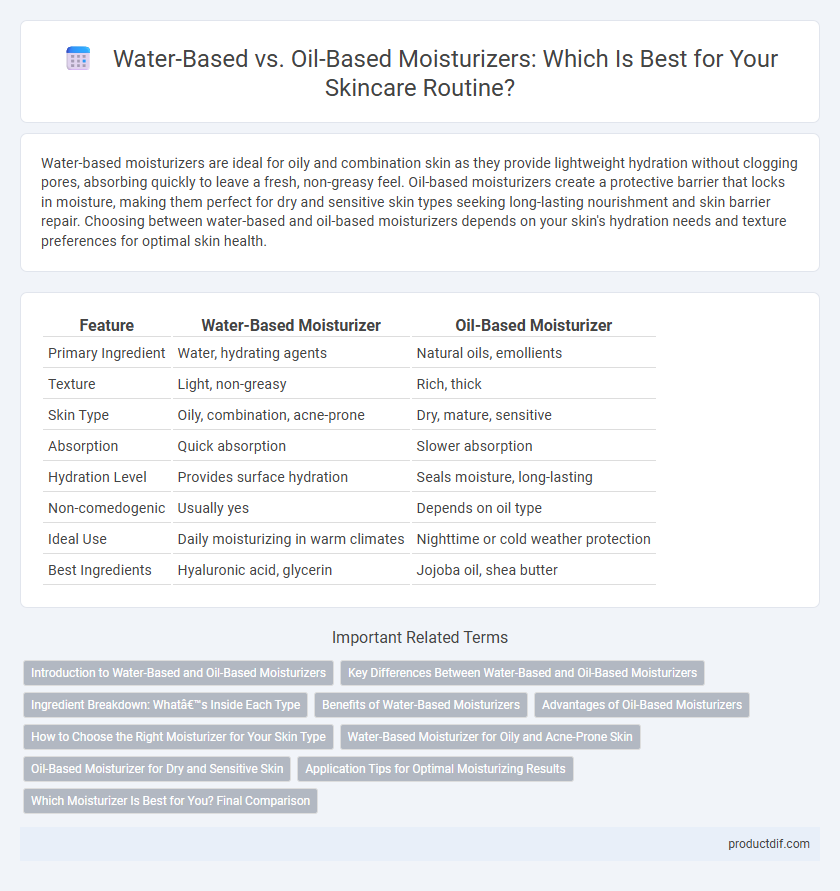Water-based moisturizers are ideal for oily and combination skin as they provide lightweight hydration without clogging pores, absorbing quickly to leave a fresh, non-greasy feel. Oil-based moisturizers create a protective barrier that locks in moisture, making them perfect for dry and sensitive skin types seeking long-lasting nourishment and skin barrier repair. Choosing between water-based and oil-based moisturizers depends on your skin's hydration needs and texture preferences for optimal skin health.
Table of Comparison
| Feature | Water-Based Moisturizer | Oil-Based Moisturizer |
|---|---|---|
| Primary Ingredient | Water, hydrating agents | Natural oils, emollients |
| Texture | Light, non-greasy | Rich, thick |
| Skin Type | Oily, combination, acne-prone | Dry, mature, sensitive |
| Absorption | Quick absorption | Slower absorption |
| Hydration Level | Provides surface hydration | Seals moisture, long-lasting |
| Non-comedogenic | Usually yes | Depends on oil type |
| Ideal Use | Daily moisturizing in warm climates | Nighttime or cold weather protection |
| Best Ingredients | Hyaluronic acid, glycerin | Jojoba oil, shea butter |
Introduction to Water-Based and Oil-Based Moisturizers
Water-based moisturizers contain a high concentration of water and lightweight humectants like glycerin or hyaluronic acid, making them ideal for oily and acne-prone skin by providing hydration without clogging pores. Oil-based moisturizers are enriched with nourishing oils such as jojoba, argan, or squalane, creating a protective barrier that locks in moisture and suits dry or mature skin types. Understanding the key ingredients and skin compatibility helps in selecting the right moisturizer for effective hydration and skin health.
Key Differences Between Water-Based and Oil-Based Moisturizers
Water-based moisturizers primarily contain water as their main ingredient, making them lightweight, fast-absorbing, and ideal for oily or acne-prone skin. Oil-based moisturizers are richer and contain oils like jojoba, argan, or coconut oil, providing deeper hydration and creating a protective barrier suitable for dry or sensitive skin. The key difference lies in their texture, absorption rate, and suitability for various skin types, with water-based formulas offering quick moisture and oil-based variants delivering long-lasting emollience.
Ingredient Breakdown: What’s Inside Each Type
Water-based moisturizers primarily contain humectants like glycerin and hyaluronic acid, which attract and retain moisture in the skin, along with lightweight emollients and preservatives. Oil-based moisturizers consist mainly of occlusive agents such as mineral oil, jojoba oil, or shea butter that create a protective barrier to lock in hydration and prevent transepidermal water loss. Formulations may also include antioxidants, vitamins, and botanical extracts to enhance skin nourishment and repair.
Benefits of Water-Based Moisturizers
Water-based moisturizers provide lightweight hydration ideal for oily and acne-prone skin, absorbing quickly without clogging pores. They deliver essential moisture to the skin's surface, enhancing skin elasticity and promoting a fresh, non-greasy finish. Ingredients like hyaluronic acid and glycerin in water-based formulas support long-lasting hydration and skin barrier function.
Advantages of Oil-Based Moisturizers
Oil-based moisturizers provide superior hydration by forming a protective barrier that locks in moisture, making them ideal for dry and sensitive skin types. Rich in essential fatty acids and antioxidants, these moisturizers support skin repair and enhance elasticity. Their long-lasting effects help maintain skin softness and prevent moisture loss throughout the day.
How to Choose the Right Moisturizer for Your Skin Type
Choosing the right moisturizer depends on your skin type, with water-based formulas ideal for oily and acne-prone skin due to their lightweight, non-comedogenic properties that hydrate without clogging pores. Oil-based moisturizers are better suited for dry or mature skin, providing intense hydration and creating a protective barrier to lock in moisture and prevent dryness. Understanding your skin's needs helps optimize hydration and maintain a balanced complexion, ensuring effective skincare tailored to individual concerns.
Water-Based Moisturizer for Oily and Acne-Prone Skin
Water-based moisturizers offer lightweight hydration ideal for oily and acne-prone skin by absorbing quickly without clogging pores. Their non-comedogenic formulas reduce the risk of breakouts while maintaining skin balance and preventing excess shine. Ingredients like hyaluronic acid and glycerin in water-based options provide effective moisture without the heaviness of oil-based products.
Oil-Based Moisturizer for Dry and Sensitive Skin
Oil-based moisturizers create a protective barrier that effectively locks in hydration, making them ideal for dry and sensitive skin types prone to moisture loss and irritation. Rich in natural oils like jojoba, argan, and almond, these formulations provide deep nourishment and improve skin elasticity without causing inflammation. Users with sensitive skin benefit from the gentle, soothing properties of oil-based moisturizers, which reduce redness and support skin barrier repair.
Application Tips for Optimal Moisturizing Results
Apply water-based moisturizers on damp skin to enhance absorption and lock in hydration effectively. For oil-based moisturizers, gently massage onto dry skin to create a protective barrier that seals moisture. Layering a water-based moisturizer first followed by an oil-based product maximizes hydration and prevents moisture loss.
Which Moisturizer Is Best for You? Final Comparison
Water-based moisturizers provide lightweight hydration ideal for oily or acne-prone skin, absorbing quickly without clogging pores, while oil-based moisturizers offer intense nourishment and long-lasting barrier protection suitable for dry or mature skin. Choosing the best moisturizer depends on your skin type and specific concerns, with water-based formulas enhancing moisture without heaviness and oil-based options sealing hydration and repairing the skin's lipid barrier. For combination skin, a hybrid or layering approach can balance hydration and oil control effectively.
Water-Based Moisturizer vs Oil-Based Moisturizer Infographic

 productdif.com
productdif.com